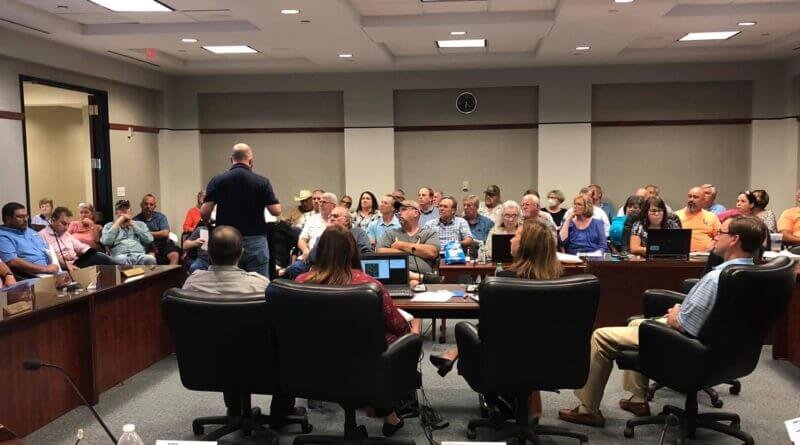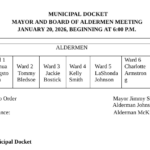Flowage easements questioned at packed meeting
Photo: The Supervisors board room is packed as U.S. Army Corps of Engineers representatives speak with county officials and residents about flowage easements near Lake Arkabutla. (Courtesy DeSoto County Government/Facebook)
Do you know what a flowage easement is? Do you need to call a plumber?
A plumber is not necessary, but for those who live or have property near Lake Arkabutla, knowing if a flowage easement is connected to that property is important. In fact, many property owners may not even know such an easement exists on their land and in trying to improve or sell their land, they may discover it may be difficult, if not impossible, to do that.
Current concerns about flowage easements on land around Arkabutla Lake began a couple of years ago. Supervisor Lee Caldwell was campaigning for re-election when she heard about flowage easements.
“There was some property off Wheeler Road that an abstractor was doing a title search and discovered that the property had a flowage easement,” said Supervisor Lee Caldwell. “On the deed, it said that you could not build within that flowage easement. That was the first time the county heard really anything about it.”
Caldwell said the flowage easements have been on certain deeds for decaades but title searches only go back about 35 years and may not immediately show up for the deed until a deeper search is done. Others may know the easements are on the deed, but don’t know what they actually mean.
As part of operating Arkabutla Dam and Reservoir, flowage easements on land near the lake were purchased by the U.S Army Corps of Engineers when the dam was built and the resulting lake was formed.
The easements place restrictions on the activities that landowners can do on their own land. For instance, building construction or expansion may be restricted or prevented entirely in the easement area. Landowners may also not be able to construct wells, septic systems or sewer lines on the property. Once the easements are in place, they can’t be removed.
Another issue is that since it’s been years since many of the easements were first purchased, property ownership may have changed hands several times and the new owners may not know the easements even exist until they try to add a room or dig a well and find out they can’t do it.
What it all means is that the Corps of Engineers can flood the land if needed, approve all construction on the land, except fencing, and prohibit and new construction, improvement or maintenance.
Flowage easements are part of the deeds to the property. The flowage easements in question with the Corps of Engineers for Arkabutla were purchased by the Vicksburg District that controls Arkabutla in the time period from the 1930s into the 1970s.
Questions about easements and their location brought a packed house to a meeting with Corps of Engineers representatives and the County Board of Supervisors Thursday evening in Hernando.
“They were able to ask lots of questions and gather information,” said Caldwell about the Thursday evening session. “We still have lots of questions that weren’t answered that we’re going to be working on in the future.”
Caldwell said one question brought up was about land above the dam height of 264.3 feet that is in a flowage easement.
“If you have property above that elevation and you’re in a flowage easement, it would make sense that you would be able to opt-out of that flowage easement,” Caldwell said. “The people from the Corps from Vicksburg said that was something that would have to be taken up the chain of command.”
County officials said they would be in contact with Corps of Engineers officials in Washington to learn about flowage easements in other parts of the country to see if there are ways to possibly opt-out from easements here.
DeSoto County is the first county where the Corps of Engineers has started to mark areas where flowage easements reside. Tate County land is set to be next in the marking process with other counties to continue.






